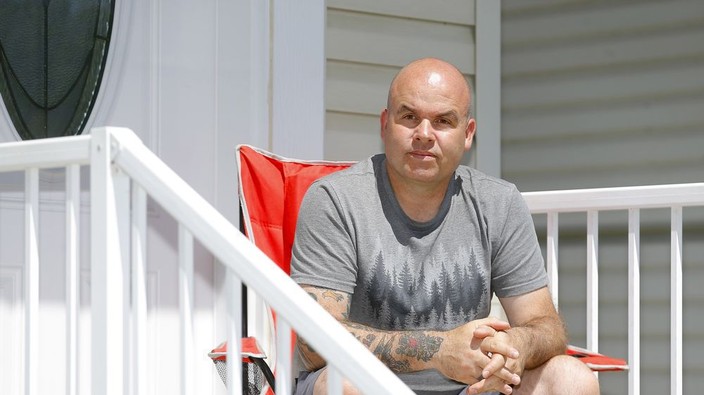man says fed assistance doesn't help those with long covid
a calgary man suffering from ongoing covid-19 symptoms says government safety nets do not meet the needs of coivd long-haulers.

scott reason is a covid long-hauler and is still suffering symptoms from catching the virus in november. he says federal covid benefits are only aimed at helping people in the short term and do little for people in his situation.
darren makowichuk
/
postmedia
by: brodie thomasa calgary man suffering from ongoing covid-19 symptoms says government safety nets do not meet the needs of covid long-haulers.scott reason contracted covid-19 in november of 2020, along with his wife and son.while the other members of his family recovered, reason has continued to suffer from ailments that never really went away, such as headaches, heart palpitations, high blood pressure, lethargy and trouble concentrating: a condition often described by covid long-haulers as “brain fog.”reason went back to his job as a frontline worker in addictions support on dec. 8, 2020, but by jan. 15 he hit a wall and had to return home.since then he’s been referred to a doctor at the post-covid clinic at peter lougheed centre.“he’s saying most people recover at about the one-year mark with long covid,” said reason. “so i’m looking at another six months, potentially.”his concern is that he has exhausted all available financial supports available to people in his situation. he was able to get 15 weeks of medical ei, but is unable to access regular ei because his employer is holding his position for him in the hope he will get better.reason said he doesn’t want to give up his job altogether to receive short-term financial support, because there is hope he will eventually recover.he said he’s not looking for a handout, but he knows there are people in a situation similar to his with even less money to fall back on.“i don’t want to make it a political thing,” said reason. “it seems strange that we’re bailing out air canada but i can’t get $1,100 every two weeks. it just doesn’t seem right.”he’s reached out to politicians at the provincial and federal level but has not received any clear answers on why he can’t get support. reason said he has been directed towards the alberta works program, but knows from experience in his own job that he wouldn’t qualify for that program.while provincial and federal governments have handed out billions in emergency response benefits, those programs were aimed at supporting people in the short term for recovering from the virus itself, or short-term job loss. the canadian emergency response benefit (cerb) provided $2,000 over a four-week period, and ended in december. a similar program was made available to students.canada also continues to offer a canada recovery sickness benefit, which is a temporary income support program for workers who need to stay home because they are unable to work at least 50 per cent of their scheduled workweek due to being sick or needing to self-isolate because of covid-19. it also provides $500 per week up to a maximum of four weeks.in general, government programs for people facing disabilities are not created for specific illnesses or disabilities, so creating one for covid long haul sufferers could be difficult.mary ann mccoll, professor at queen’s university and academic lead for the canadian disability alliance, said defining disabilities, temporary or otherwise, is a thorny issue in canadian politics.“for policymakers, they’re faced with this enormous conundrum of making sure people who need it get what they need, but also making sure that there’s enough to go around,” she said.during the pandemic, the government of canada gave a one-time $600 payment to canadians on the canada pension plan disability roster. the non-taxable, one-time payment was “in recognition of the extraordinary expenses incurred by persons with disabilities” during the pandemic, according to the government’s website.“even those who got it, it’s still one time — $600 — it’s a pretty paltry acknowledgment of the extraordinary expenses that people have,” said mccoll.federal opposition health critic michelle rempel garner said there have been numerous propositions to increase ei disability from 15 weeks to 50 weeks or a full year, but they have not made it through the house of commons.“the liberals have proposed a half-measure of 26 weeks, but i believe that that measure isn’t in place and there’s a lack of clarity on when that would come into force,” said rempel garner.in an email, a spokesperson from employment and social development canada said the federal government made it easier for canadians to access ei disability in numerous ways, such as waiving the requirement to submit a medical certificate for ei sickness benefits for one year.the spokesperson also clarified that the extension of ei disability from 15 to 26 weeks is going to happen, but not until the summer of next year.that’s of little help to covid long haulers like reason who are dealing with the problem now.“i had some savings but they’re almost gone,” he said. “i’m going to start using my rrsps, it’s unfortunate that it has to come to that.”
 3 minute read
3 minute read





